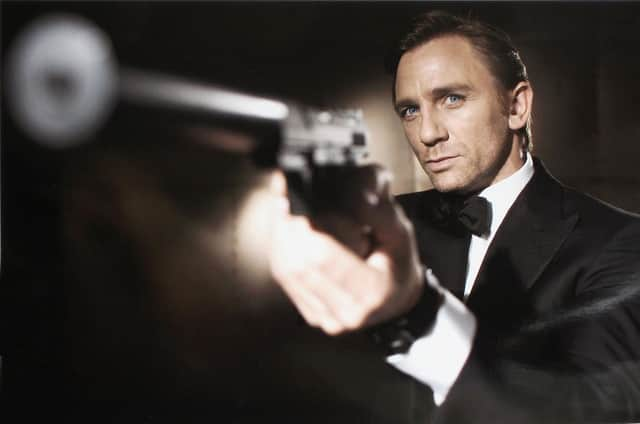James Bond's enduring appeal is best understood through the books – Alastair Stewart


The re-releases, up to Goldeneye (1995) at the time of writing, are a phenomenal treat as part of the 60th anniversary of the film franchise. Theatres are packed with fans laughing, cheering and applauding by the time the end titles roll.
Not bad going for "a sexist, misogynist dinosaur. A relic of the Cold War", as Judy Dench's M surmised. Bond, at 60, is a vibrant and healthy franchise and is unlikely to be retiring any time soon.
Advertisement
Hide AdAdvertisement
Hide AdBut what of his big brother? Next year is the 70th anniversary of Ian Fleming's inaugural Bond outing, Casino Royale. The literary 007 was already weary in 1953 and spends a fair portion of the novel reflecting that "history is moving pretty quickly these days and the heroes and villains keep on changing parts”.
It is a postmodern hobby horse to deconstruct supermen of the stage, screen and books. Everyone is a phoney, and selfless acts of ingenuity, strength and courage can never be as pure as legend would have it.
In amongst the funeral pyre are the occasional cinders of fascinating introspection. "Do we need heroes, and if so, what are their virtues?" is a question as old as time and one which Aristotle partly answered in his Poetics (circa 335 BC) with his definition of tragic heroes.
These heroes are virtuous (and usually a man of noble birth) but not "eminently good" and they can suffer a reversal of fortune and challenges. They are flawed individuals who commit, without evil intent, great wrongs or injuries that ultimately lead to their misfortune. They feel responsible to the rules of honour and morality that guided Greek culture.
Bond cannot be deconstructed. He was always a damaged, reluctant hero bound to his own decency while murdering for a living on the orders of his government. What the likes of Daniel Craig did with Skyfall (2012) and particularly in his recent and final outing, No Time to Die (2021), is actually what fans will recognise as a hallmark of the book series.
Fleming's creation was a cold, anachronistic gentleman soldier and a more cynical beast than his gadget-laden cinematic counterpart. Look closely, and the best original books are the ones where he is a jaded walking canvass of scars.
From Russia, with Love (1957) ended on a cliffhanger with Bond dying from poisoning. By the end of You Only Live Twice (1964), 007 is believed dead but is suffering amnesia and living as a fisherman in Japan. The violence is brutal and savage, the action scenes are more close-quartered and visceral, and there is an unavoidable tone of futility in the face of evil.
Between 1962 and 1963, there was a brief convergence of the Bonds. Fleming was initially horrified with the unpolished Sean Connery portraying the secret agent. Latterly he was so impressed he canonised Bond as being half-Scottish, half-Swiss in On Her Majesty's Secret Service – England's greatest hero was always a Scot, both on the screen and in the novels.
Advertisement
Hide AdAdvertisement
Hide AdFast forward to 2023, and questions about who and what Bond is are far more profound in the literary continuations than they ever could be in the movies. Anthony Horowitz is the latest author allowed to continue 007's official adventures, licenced to kill by Ian Fleming Publications.
His most recent and final Bond book, With a Mind to Kill (2022), is an excellent thriller but a better inquiry into whether we need heroes. Set two weeks after the furthest chronological point of Fleming's material, The Man With the Golden Gun (1965), a wounded Bond leads a desperate mission into the Soviet Union in the face of shifting political sands.
Horowitz has pulled together the existential threads started by Fleming and taken them to a surprising, brilliant conclusion that could rival any movie. It is a book series begging for a cinematic adaptation.
Not only do the previous Horowtiz novels, Trigger Mortis (2015) and Forever and a Day (2018), enjoy pinches of unused Fleming material, but they manage to dovetail the Fleming series and create a tragic, heroic figure in Bond.
When I visited Macedonia in April, "James, Bond, James" was graffitied over an old sign for Bond cigarettes. James Bond the brand is ubiquitous, and while the books can and will never disappear, their merits – sometimes under the shadow of the film franchise – should be shouted from the rooftops.
It is curious, particularly given contemporary demands for something more three-dimensional than an outmoded movie pastiche of drink-sodden bon vivant. Book Bond has a gentlemanly code of honour forever challenged by the personal toll and the vulgarity of murder disguised as patriotism.
Colonal Sun (1968), from Kingsley Amis, was the first licenced effort to continue Fleming's work. It does not shy away from these themes, either. It is a brilliant, underestimated story and one that should be adopted in its entirety (most Bond movies bear no resemblance to their namesake books).
Devil May Care (2008) by Sebastian Faulks was a PR sensation and took the character back to his 1960s heyday: battered, lagging and on the cusp of being replaced by M. William Boyd's Solo (2013) was remarkably thoughtful with a 45-year-old Bond feeling his age, and no more so than on his birthday. If you squeeze in Horowtiz's timeline, Boyd's ending could be the most subtle finale for the character.
Advertisement
Hide AdAdvertisement
Hide AdAll the movie Bonds have their moments. If you have the time, there are plenty of opportunities to savour them on the big screen at Vue and Cineworld.
But it is no great secret that the stand-out Bond films have a hearty weariness, viciousness and a cool bluntness that is straight out of Fleming's classics. Go to a bookshop before you go to the cinema.
Comments
Want to join the conversation? Please or to comment on this article.
